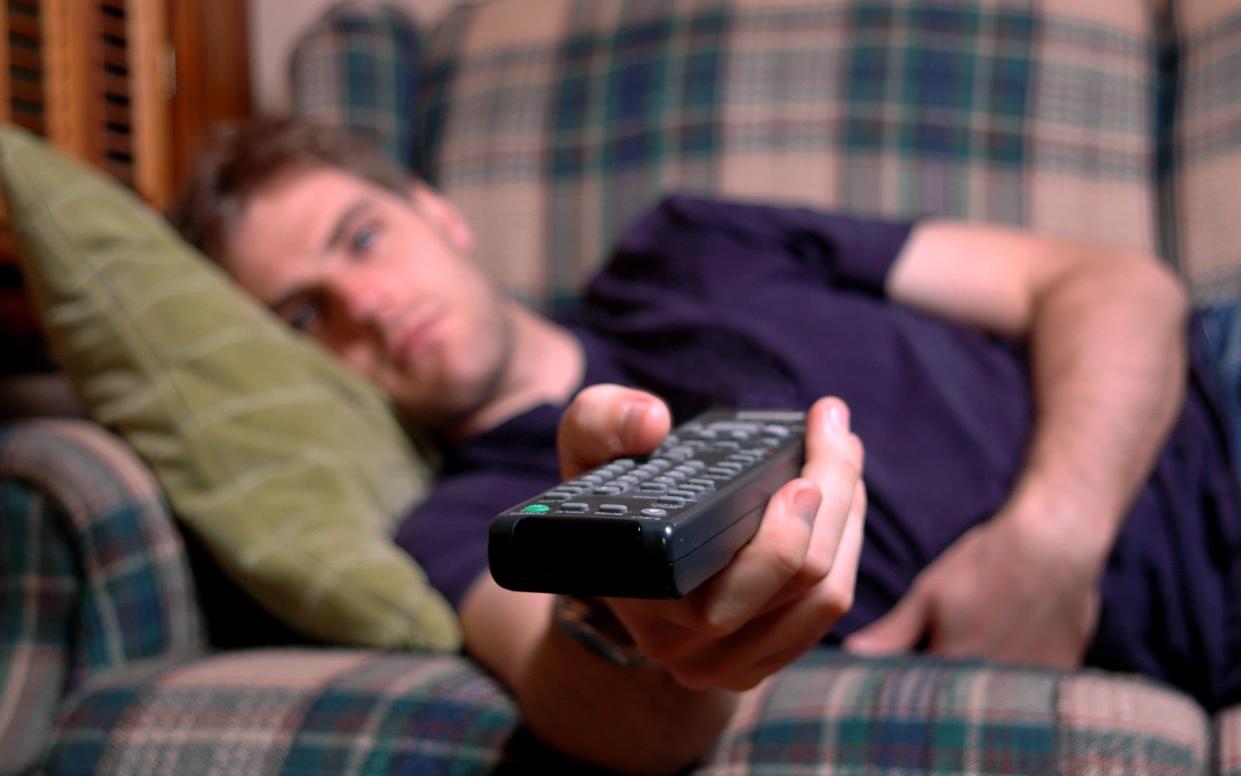What TV binges are doing to our bodies (by a TV critic)

- Oops!Something went wrong.Please try again later.
- Oops!Something went wrong.Please try again later.
In cult Japanese horror movie Ring, televisions flicker mysteriously to life and then kill the viewer. While a similar catastrophe is unlikely to occur midway through your latest Netflix marathon – though by the end of Emily In Paris I half expected Lily Collins to climb out of the screen and batter me unconscious with a tartan beret – new research suggests streaming to excess can have long-term health consequences.
A study indicates that binge-watching may significantly increase the risk of blood clots. The chances of a clot were about a third higher among adults who spent four or more hours in front of the television each day, found a team at Bristol University, who suggested Netflix diehards consider swapping their couch for a stationary bike (though look what that did to a pre-cancelled Mr Big in Sex and the City spin-off And Just Like That).
None of us gets to choose how and when we shuffle into the great beyond. However, if we did, there are perhaps worse ways to go than to suddenly keel over halfway through Selling Sunset. This would be a tragedy but at least you wouldn’t have to watch any more Selling Sunset.
Reading these studies left me conflicted. As someone who occasionally watches television for a living, I understand only too well the bum-numbing effects of a binge marathon.
I recently had to watch a four-hour US documentary all the way through, for the purposes of work. There is no easy way to watch a four-hour documentary from start to finish and by the conclusion I was slumped and incoherent, my shoulders aching, the lower half of my body apparently cut off from my blood supply.
As this happened, I experienced flashbacks to the time I had to binge an entire season of Kevin Spacey’s House of Cards. It ran to 13 hours and the brief was to have the entire thing consumed by tea-time. A number of episodes had been provided in advance to journalists. But I still had to sit through hour after hour of Spacey winking at the camera and Robin Wright looking as if she was sitting in a draught.
The emotional impact of hours of smug Spacey hardly need to be elaborated on. What stunned me, though, was how physically vulnerable it left me. Going for a run that night, I nearly fainted.

According to the research published in the European Journal of Preventative Cardiology, feeling spaced after Spacey was no fluke. The Bristol University team examined three studies with a total of 131,421 participants from the US and Japan aged 40 and over – and with no prior blood clotting diagnosis. The volunteers were asked about their TV habits and then divided into “prolonged viewers” – who watched more than four hours of TV per day – and “seldom viewers”, who watched less than two and a half hours. The participants were monitored over a period of five to 20 years. “Prolonged viewers” were 1.35 times more likely to develop clots than “seldom viewers”.
“The findings indicate that regardless of physical activity, your BMI, how old you are and your gender, watching many hours of television is a risky activity with regards to developing blood clots,” said Dr Setor Kunutsor, a researcher at Bristol University and lead study author.
He added that dedicated bingers should review their viewing habits to ensure they took time away from the sofa. “If you are going to binge on TV you need to take breaks.”
Professor Andrew Steptoe, head of the Department of Behavioural Science and Health Institute of Epidemiology and Health Care, University College London, points out: “The research on which this study was based did not actually ask people how many hours they watched TV without moving, but just how many hours they watched TV. Still, it’s a reasonable assumption that much of the viewing was uninterrupted.”
He adds, however, that the data confirms what we already know: that too much couch-potato time is bad for you.
“This study provides further evidence for the health risks of sitting down for extended periods without interruption, as opposed to being physically active,” he says. “We already know from other large-scale research that men and women with sedentary lifestyles are at increased risk of developing serious illnesses and of dying prematurely.
“This study focuses on the problem of thromboembolism, a common form of which is deep vein thrombosis, a well-known issue for people on long haul flights. What this research has done is investigate another type of prolonged sedentary activity, namely watching TV. The work on which this study was based was mainly done before the advent of streaming services, binge watching, and the restrictions of the Covid pandemic, so the problems are, if anything, likely to have got worse.”
Should we throw away our remotes and cancel our Netflix and Amazon Prime subscriptions, then? One less extreme solution may be to follow the advice of the Bristol University team and take the occasional time out. In the pre-streaming ancient past, ads offered an opportunity to nip to the loo or put on the kettle. In the age of streaming, we need to carve out those crucial break time ourselves.
Failing that, you could always just move about more. Sometimes, while reviewing an especially numbing Netflix boxset, I will watch the TV standing up or pacing the room. This earns the occasional odd glance from a neighbour passing outside. Still, experts say anything is better than simply sitting there, melding with our couch.
“As with office work, the recommendation must be to stand up and move around on a regular basis, and not sit still for many hours at a time,” says Steptoe. “Television is not bad for our health, but the way we watch may be damaging.”

